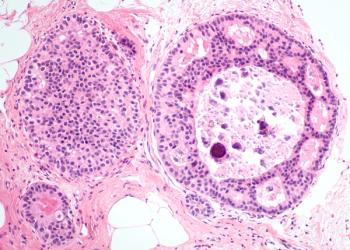
- MHE August 2024
- Volume 34
- Issue 8
Two More TROP2-Seeking ADCs Are in Late-Stage Development
If approved by the FDA they would join Trodelvy as a treatment for triple-negative breast cancer.
Triple-negative breast cancer accounts for about 15% of breast cancers and is considered the most aggressive type, with a five-year survival rate of approximately 30%. The four-year survival rate for patients with metastatic cases is about 11%. Current standard treatment consists of chemotherapy alone or combined with immunotherapy, followed by tumor removal for
nonmetastatic stages.
Antibody-drug conjugates (ADCs) have been making a mark in oncology because they target cancer cells and deliver tumor-killing payloads with fewer side effects than traditional chemotherapy. They consist of an antibody that homes in on a specific biomarker on tumor cells, a chemotherapy agent that is released once the antibody attaches to the cancer cell, and a linker that connects the two.
Trophoblast cell surface antigen 2 (TROP2) is a protein rarely found in healthy tissue but widely expressed in triple-negative breast cancer and other solid tumors. It is associated with increased tumor progression and a poor prognosis for people with breast cancer. The FDA approved Trodelvy (sacituzumab govitecan), a TROP2-directed ADC,as a treatment for triple-negative breast cancer in 2021. Two other TROP2-directed ADCs are late-stage trials.
Datopotamab deruxtecan
AstraZeneca has partnered with Daiichi Sankyo, a Japanese company, to develop datopotamab deruxtecan, an investigational TROP2-targeted ADC. Datopotamab deruxtecan consists of a humanized anti-TROP2 immunoglobulin G1 monoclonal antibody linked to a highly potent exatecan-derived topoisomerase I inhibitor. A serum-stable cleavable linker is designed to reduce systemic exposure of the payload, which can lead to off-target side effects.
Researchers are evaluating datopotamab deruxtecan as a treatment for triple-negative breast cancer in two phase 3 trials. The TROPION-Breast04 trial is evaluating first-line datopotamab deruxtecan plus the immune checkpoint inhibitor Imfinzi (durvalumab) followed by Imfinzi as adjuvant therapy with or without chemotherapy in participants with early-stage triple-negative breast cancer or HR or HER2 low or negative breast cancer. The primary end points are pathological complete response and event-free survival.
The TROPION-Breast05 study is evaluating the use of datopotamab deruxtecan alone and combined with Imfinzi in adults with locally advanced or metastatic triple-negative breast cancer with PD-L1-expressing tumors. The primary end point for this trial is progression-free survival. The FDA recently accepted an application for the use of datopotamab deruxtecan in HR-positive/HER2-negative metastatic breast cancer.
Sacituzumab tirumotecan
Merck is collaborating with Sichuan Kelun-Biotech, a Chinese company, to develop sacituzumab tirumotecan, an investigational ADC consisting of a TROP2-targeting antibody linked to a belotecan-derived topoisomerase I inhibitor payload. The conjugate has a novel linker that allows for pH-based cleavage of the ADC outside the cell and enzyme-based cleavage inside.
Data from the phase 3 OptiTROP-Breast01 study were presented at the 2024 American Society of Clinical Oncology (ASCO) Annual Meeting and published in abstract form in the May 2024 issue of the Journal of Clinical Oncology. Sacituzumab tirumotecan demonstrated significant progression-free survival and overall survival compared with physician’s choice of chemotherapy in participants with locally recurrent or metastatic triple-negative breast cancer.
Articles in this issue
over 1 year ago
Abby Sugg, M.S.H.C.M | 2024 Emerging Leaders in Healthcareover 1 year ago
Nick Stepro | 2024 Emerging Leaders in Healthcareover 1 year ago
Anoop Raman, M.D., MBA | 2024 Emerging Leaders in Healthcareover 1 year ago
Charles Lin, M.S. | 2024 Emerging Leaders in Healthcareover 1 year ago
Jamie Bullus, M.P.H. | 2024 Emerging Leaders in HealthcareNewsletter
Get the latest industry news, event updates, and more from Managed healthcare Executive.























